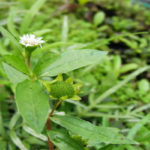Caring for a baby is a sacred duty for mothers. During this process, mothers always have to look for the best methods. In the article below, we have compiled five folk tips to help mothers take care of their babies and stay relaxed. Let’s follow these tips!
1 Using betel leaf resin to shape the baby’s eyebrows
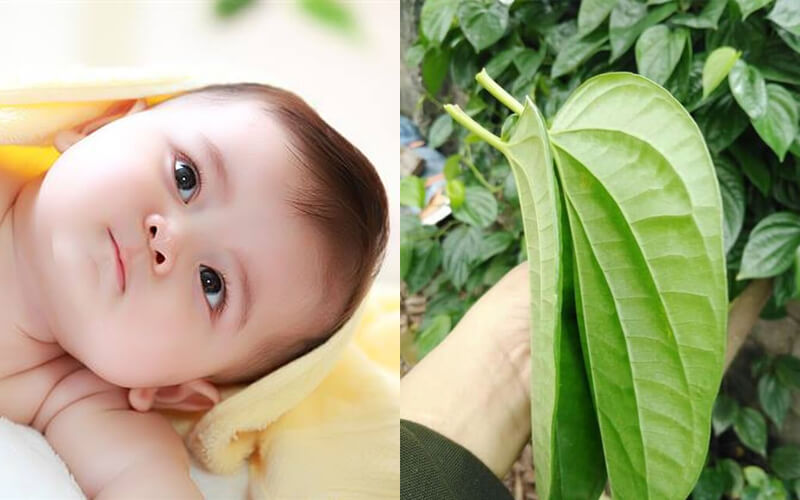 Using betel leaf resin to shape the baby’s eyebrows
Using betel leaf resin to shape the baby’s eyebrows
The eyes are the window to the soul, and beautiful eyes are enhanced by well-shaped eyebrows. Many mothers have shared a tip that betel leaf resin will help the baby’s eyebrows become thicker and more beautiful.
This method is applied to newborns. Mothers just need to buy betel leaves, cut the stems, and use the resin to draw the desired eyebrow shape. Later, the baby’s eyebrows will grow along the lines of the betel leaf resin, becoming thicker and more defined.
In fact, there is no scientific evidence to support the effectiveness of this eyebrow-shaping method using betel leaf resin. Most newborns have very light eyebrows, which will gradually darken over time, depending on the genetic factors inherited from their parents. When it comes to genetics, external influences will have little effect.
Using betel leaf resin may cause allergies and itching on the baby’s delicate and sensitive skin. If mothers still want to try this method, they must be extremely careful!
According to Doctor Do Thi Thanh Huong from the International Medicine Hair Transplant Clinic, to help the baby achieve beautiful eyebrows, you can use coconut oil to stimulate eyebrow growth, making them thicker and more attractive. Coconut oil contains saturated fatty acids that promote hair growth.
You can apply coconut oil to the baby’s eyebrows and gently massage it in. Wait for about 10-15 minutes, then rinse it off with water.
2 Using lemon to treat vomiting in children
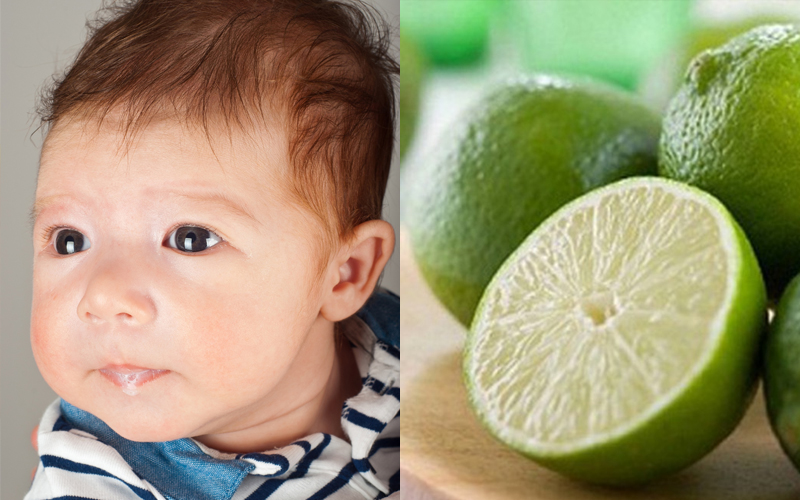 Using lemon to treat vomiting in children
Using lemon to treat vomiting in children
If a child vomits infrequently and it is not due to gastroesophageal reflux, a folk remedy suggests giving the baby lemon water.
To prepare this remedy, slice a lemon thinly and place the slices in a cup. Add a little boiling water to release the lemon juice, then wait for the water to cool slightly before adding a few drops of honey and giving it to the baby to drink.
According to herbalist Vu Xuan Dieu from the Vietnam Thanh Center for Traditional Medicine, lemon and honey have excellent anti-inflammatory properties. Giving the baby lemon and honey water can soothe the stomach and reduce vomiting.
3 Folk remedy for treating colds, runny nose, and cough in children
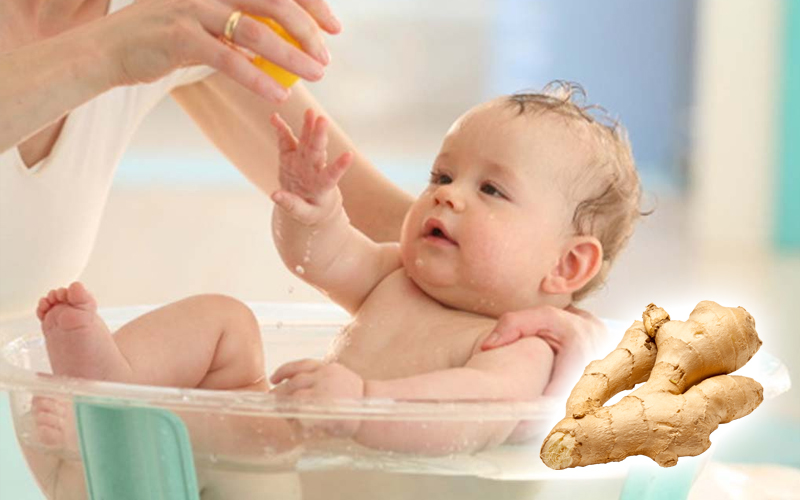 Using ginger bath to treat colds, runny nose, and cough in children
Using ginger bath to treat colds, runny nose, and cough in children
It is very common for children to suffer from colds, coughs, or runny noses, especially for those with weak immune systems. When a child falls ill, mothers worry a lot, but there is a folk tip that many mothers use to help their children recover without resorting to Western medicine: using fresh ginger to prepare bathwater.
Specifically, mothers can use fresh ginger, wash and crush it, then boil it to make bathwater for the baby. Mothers can also help the baby soak in this ginger water to benefit from the ginger’s essential oils and relieve cold symptoms.
Even today, using fresh ginger to relieve cold symptoms is a valid practice. According to Master’s degree doctor Le Thuan Linh, Head of the Department of Nutrition and Dietetics at Thu Duc Hospital in Ho Chi Minh City, the components in ginger’s essential oil have excellent anti-inflammatory, decongestant, cough-relieving, and immune-boosting properties.
4 Folk remedy for fever when teething
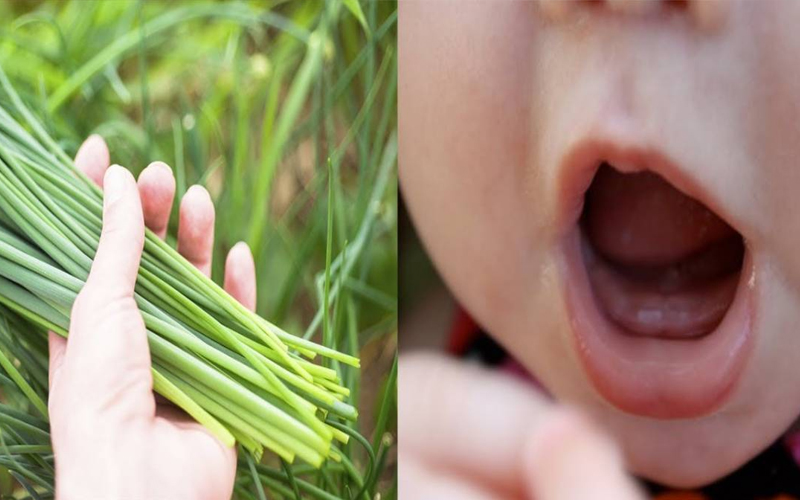 Using chives to treat fever when teething
Using chives to treat fever when teething
Fever during teething is a common issue that most babies experience. During this phase, the baby may feel painful and cry a lot, causing distress to both the baby and the mother.
To effectively alleviate this condition, a folk remedy suggests that before the baby starts teething, mothers can use a handful of fresh chives, crush them, and apply the juice to the baby’s gums. This is believed to prevent pain, swelling, and inflammation that can lead to fever when the baby starts teething.
If you forget to do this before the baby starts teething and they are already experiencing pain and crying, use fresh chives and extract the juice, then use a piece of gauze to apply the juice to the baby’s gums after breastfeeding to relieve the pain.
According to Master’s degree doctor Dao Huu Minh, Deputy Head of the Examination Department at the Central Hospital of Traditional Medicine, using chives to reduce fever during teething is a folk method passed down by mothers, and there is no actual research to prove its effectiveness.
Doctor Dao Huu Minh added that chives have a warming effect and possess anti-inflammatory and antibacterial properties. Many parents have tried this method and found it successful, so if you wish, you can give it a try. However, it is essential to ensure cleanliness, washing the chives thoroughly before juicing them and applying them to the baby’s gums.
5 Folk remedy for hiccups in babies
 Using sugar to treat hiccups in babies
Using sugar to treat hiccups in babies
Reference: Hiccup in children: Causes and
When a baby has hiccups, in addition to giving them water to improve the condition, a folk remedy suggests placing a small amount of sugar on the baby’s tongue to allow the sweetness to permeate the tongue and return the body to a normal state. The hiccups will disappear, and the baby will no longer feel uncomfortable.
According to Doctor Nguyen Duc Kiet from Dong Duoc Phu Ha, sugar granules can cause mild irritation to the esophagus, which may stimulate the body’s nerves to reset and stop the spasms that cause hiccups.
Therefore, when your baby has hiccups, try this folk remedy to quickly get rid of those annoying hiccups!
Note: This method is only applicable for children over two years old who have started complementary feeding.
If your baby is under one year old, you can refer to the method of using honey to treat hiccups. Simply dip the baby’s pacifier in honey and place it in their mouth.
To ensure a sufficient milk supply for your baby, try these tips! These tips will not only help you produce more milk but also improve your overall health.
We hope that with these tips, mothers can easily care for their babies and keep them healthy and happy!
1. Ensure adequate nutrition: Breastmilk or formula should be the primary source of nutrition for the first year. Introduce solid foods gradually around the age of six months, offering a variety of nutritious options.
2. Encourage self-feeding: Allow babies to feed themselves using their hands or utensils as they grow. This promotes independence and a healthy relationship with food.
3. Don’t force-feed: Respect your baby’s appetite and don’t force them to finish their meals. Allow them to stop eating when they’re full.
4. Provide ample sleep: Sufficient sleep is crucial for a baby’s growth and development. Establish a consistent sleep schedule and create a soothing bedtime routine.
5. Promote active play: Engage your baby in daily active play, such as tummy time, reaching for toys, or gentle exercises. This helps develop motor skills and promotes healthy weight gain.
























